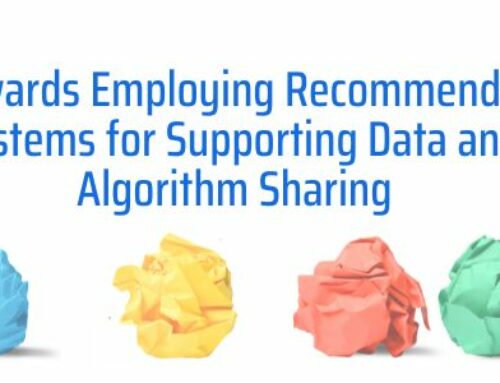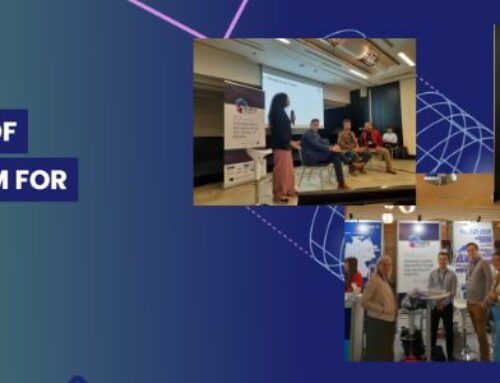A TRUSTS event
1 March 2022 – Under the title “The Federation of Data Markets and the Importance of Data Sharing in the EU” partners of the TRUSTS consortium examined relevant aspects of business, legal and ethics perspective as well as privacy issues when it comes to data markets and data sharing. Moderated by the coordinator Alexandra Garatzogianni, the online event showed important aspects and where TRUSTS contributes.
Towards a business model to federate data marketplace platforms
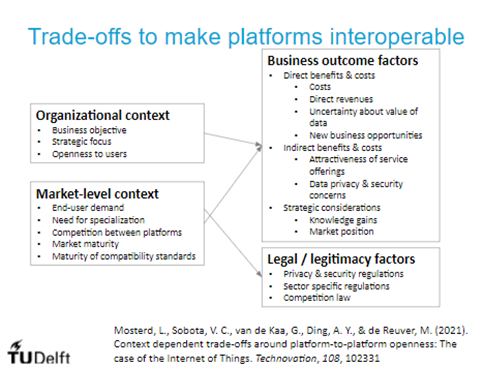 Data platforms or data marketplaces are now emerging to facilitate data exchange. In the opinion of policy makers data should be a tradeable commodity, just like money or other resources. And then boom the EU data industry. But so far, there is very little success, lack of knowledge [1] and a lot of issues that need to be solved like openness, privacy, security, regulation, competitiveness, or business interests. The already existing approaches are divers and fragmented – there are marketplaces on national or city-level, some are industry-specific (e.g., mobility, industry, …) or data type specific (e.g., IoT, personal, business). Therefore, TRUSTS is dedicated to the question how can platforms work together? and aims at supporting the creation of a federated data marketplace, from business side with a systematic overview of archetypical data marketplace business models and an exemplar business model for data marketplace federation.
Data platforms or data marketplaces are now emerging to facilitate data exchange. In the opinion of policy makers data should be a tradeable commodity, just like money or other resources. And then boom the EU data industry. But so far, there is very little success, lack of knowledge [1] and a lot of issues that need to be solved like openness, privacy, security, regulation, competitiveness, or business interests. The already existing approaches are divers and fragmented – there are marketplaces on national or city-level, some are industry-specific (e.g., mobility, industry, …) or data type specific (e.g., IoT, personal, business). Therefore, TRUSTS is dedicated to the question how can platforms work together? and aims at supporting the creation of a federated data marketplace, from business side with a systematic overview of archetypical data marketplace business models and an exemplar business model for data marketplace federation.
“Data markets will target communities with common interest. They collectively constitute their data spaces; yet data spaces should interoperate and not stand on their own. We have to federate in order to progress and create a dynamic environment in order to find a way to create a big ecosystem.” – Mark de Reuver (TU Delft)
From theory to practice
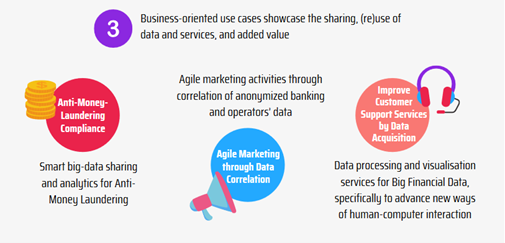 To bridge the gap from theory to practical implementation, TRUSTS uses three use cases from financial and telecommunications operator industries to demonstrate and recognise the added value of the TRUSTS platform in showcase the sharing, trading and use of data, services, and applications.
To bridge the gap from theory to practical implementation, TRUSTS uses three use cases from financial and telecommunications operator industries to demonstrate and recognise the added value of the TRUSTS platform in showcase the sharing, trading and use of data, services, and applications.
The first use case demonstration phase was concluded in November 2021 (read more about it). During Cycle 1, 21 trial sessions were performed by the three UCs with 121 test steps where all functionalities implemented in the first version of the TRUSTS platform were thoroughly tested [2]. The project is now in phase 2 and works on increasing the usability and extending the functionality of the platform. The trials are a way to evaluate functionalities and services of the data market platform and to make sure that the project is on the right path. The three uses cases serve to validate. The TRUSTS platform itself can serve any interested party as a data exchange marketplace. So if you are interested in participate in the trials, do not hesitate and contact gianna@ebos.com or use the TRUSTS contact form.
How emerging technologies enable trustworthy data sharing
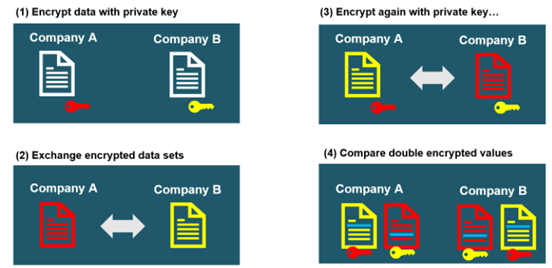 An important aspect about data sharing is – the project name might be a hint – trustworthiness. “There are different techniques that allow secure collaboration”, Andreas Trügler (KNOW Center) explained. “For example: the homomorphic encryption can do calculations with encrypted date without decrypt it, which can be used e.g., for outsourcing data for training a machine learning model. Another example would be the private set intersection, which is a cryptographic protocol: it encrypts data with a private key, exchange encrypted data sets and encrypt it again with a private key.”
An important aspect about data sharing is – the project name might be a hint – trustworthiness. “There are different techniques that allow secure collaboration”, Andreas Trügler (KNOW Center) explained. “For example: the homomorphic encryption can do calculations with encrypted date without decrypt it, which can be used e.g., for outsourcing data for training a machine learning model. Another example would be the private set intersection, which is a cryptographic protocol: it encrypts data with a private key, exchange encrypted data sets and encrypt it again with a private key.”
Within TRUSTS we are trying to tackle challenges [3] in providing legal and technical perspectives on privacy-preserving analytics, merging encryption with other machine learning approaches or working on prototypes like an industry-ready PSI solution: PSIttacus.
Solid legal and ethical principles
Trust is not only a matter regarding to privacy. For achieving trust, a solid legal and ethical framework is important. To make data sharing work we need to overcome the fear to place trusts in involved parties.
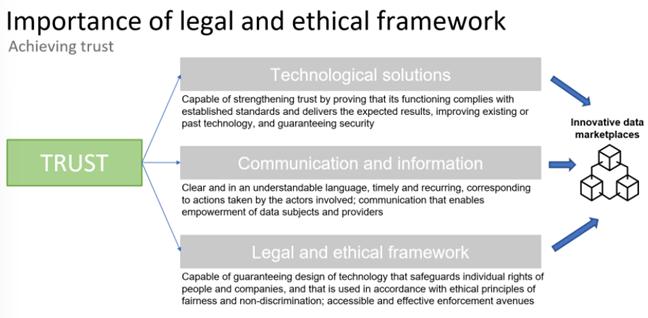 One of the challenges here is that the legal framework is in motion – the EU is trying to give response to the need that industry and society have regarding data sharing and data trading. Therefore, we are following the development and discussions very attentive.
One of the challenges here is that the legal framework is in motion – the EU is trying to give response to the need that industry and society have regarding data sharing and data trading. Therefore, we are following the development and discussions very attentive.
Within TRUSTS we already investigated research ethics principles and addressed the legal and ethical issues arising from the research activities to be conducted throughout the project. Besides, we identified challenges which are relevant to the platform as well as legislation, principles, and values regarding the sharing of data and elicit requirements. Next step is the legal and ethical assessment: we want to provide guidance to implement the legal and ethical requirements; clarify legal questions; identify legal and ethical barriers and validate the project from.
Thank you to all who participated in this event!
[1] More: Creating a Taxonomy of Business Models for Data Marketplaces: https://www.researchgate.net/publication/352781995_Creating_a_Taxonomy_of_Business_Models_for_Data_Marketplaces
[2] If you want to dig deeper into: Initial results and lessons learnt were reported in the public deliverable D5.10 entitled “Performance evaluation and lessons learnt report I”
[3] If you are interested in open challenges for privacy: Privacy in Open Search: A Review of Challenges and Solutions

